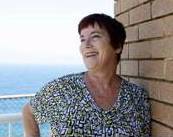1946 - 2003
Elisabeth Wynhausen could be a pain in the neck. She was raucous. She wouldn't let up. Her default setting was full throttle. And she had an unwavering confidence that she and she alone knew how the world worked.
But her loud mouth and sharp eyes were attached to a great heart. She had insight and was endlessly funny. Her friendships were deep. Her sympathies sound. All the restraint she lacked in life, she brought to bear on prose that was sparse and true. Her taste was impeccable. She was forgiven everything by her friends and a lot by her editors. Getting a story out of Wynhausen was an all-of-paper operation: endless talk and cigarettes and missed deadlines as she taste-tested each paragraph rolling slowly out of her typewriter. She ignored advice and took applause in her stride.
Elisabeth Wynhausen was born in Holland on June 23, 1946 to Paul Wynhausen and Marianne Nathans, who met in exile in Switzerland during the war. Grandparents and cousins were slaughtered in the camps.
In 1951 they brought Elisabeth and her little brother Jules to Sydney, where Paul later drove taxis and Marianne opened Paris Frocks of Manly.
The daughter and the mother she adored were so alike. They had the same laugh, the same mischievousness and intellectual curiosity. Nan was canny. Elisabeth could live well on next to nothing. Late in life she wrote a fine essay celebrating her mother and brother: On Resilience.
She gave journalism a try after idling on the bohemian fringe of Sydney and trying to teach at a girl's boarding school. She was rude to the Packers and rose through the ranks. She was soon writing for Donald Horne's Bulletin and then crossed town to Fairfax and The National Times.
Wreathed in cigarette smoke, cackling at her own jokes and nudged by her husband, the critic Don Anderson, she turned out work of great elegance and bravery. Her stories were events.
After she and Don separated, Wynhausen spent the 1980s in New York, where she found and lost the love of her life. Sitting in her loft at the bottom of Broadway she wrote for The Age, The National Times and Ita Buttrose's The Australian Women's Weekly.
But her real work in those years was the best thing she ever wrote, her memoir, Manly Girls: ''We came to Australia by accident …'' When she returned to Sydney to be close to her ageing parents, she worked first at The Sun-Herald and then she began her long and fiery stint on The Australian. Wynhausen made no secret of her hostility to the paper's political line. In her fifties, she counted herself a rebel. Her mockery of the paper's senior editors is part of the folklore of contemporary journalism.
Wynhausen came from a world of hard work and voiceless people. Her years in America had left her more determined than ever to report that territory. Her social conscience was strong but not ideological. Theory was not her strength. What she did was win people's confidence and tell their stories.
Two remarkable books came from this: Dirt Cheap, written after a year spent working in menial jobs around the country, and The Short Goodbye, which investigated the human wreckage of the global financial crisis. Its first chapter is a pithy report of her own sacking from The Australian.
Wynhausen was remaking herself as a tweeter and blogger - Betty of Bondi - when she learnt in May this year that she had pancreatic cancer. The news was kept from all but a close circle of friends. She did not want to be pitied, or be encumbered by other people's grief. Elisabeth Wynhausen is survived by her family - niece Gabi and nephew Jesse, their partners and children - by friends, by colleagues of the past 45 years, and by her writing. Just before she died she placed the best of it on elisabethwynhausen.com.
Her funeral is on Thursday, September 12, at 2.15pm at Eastern Suburbs Memorial Park, Military Road, Matraville.
David Marr - Sydney Morning Herald:
Elisabeth Wynhausen: A writer sharp of eye and tongue

Elisabeth Wynhausen

